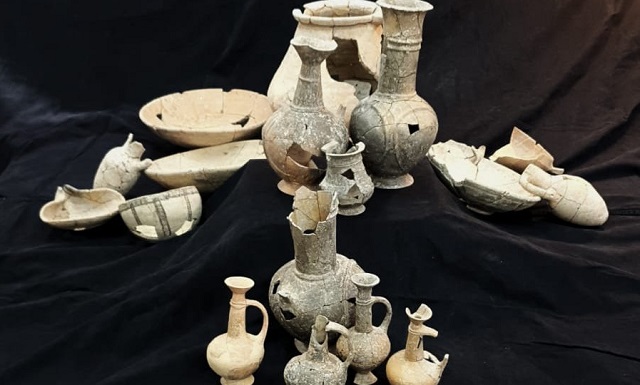A new study by the Israel Antiquities Authority, Tel Aviv University and The Weizmann Institute of Science has revealed the earliest known evidence of the use of the hallucinogenic drug opium, and psychoactive drugs in general, in the world. The opium residue was found in ceramic vessels discovered at Tel Yehud, in an excavation conducted by Eriola Jakoel on behalf of the Antiquities Authority. The vessels that contained the opium date back to the 14th century BC, and they were found in Canaanite graves, apparently having been used in local burial rituals.
The researchers said that this discovery confirms historical writings and archeological hypotheses according to which opium and its trade played a central role in the cultures of the Near East.
The research was conducted as part of Vanessa Linares’s doctoral thesis, under the guidance of Prof. Oded Lipschits and Prof. Yuval Gadot of Tel Aviv University’s Department of Archeology and Prof. Ronny Neumann of the Weizmann Institute, in collaboration with Eriola Jakoel and Dr. Ron Be’eri of the Israel Antiquities Authority, and The study was published in the journal Archaeometry.
Will you offer us a hand? Every gift, regardless of size, fuels our future.
Your critical contribution enables us to maintain our independence from shareholders or wealthy owners, allowing us to keep up reporting without bias. It means we can continue to make Jewish Business News available to everyone.
You can support us for as little as $1 via PayPal at office@jewishbusinessnews.com.
Thank you.
In 2012, the Antiquities Authority conducted a salvage excavation at the Tel Yehud site, prior to the construction of residences there. A number of Canaanite graves from the Late Bronze Age were found in the excavation, and next to them burial offerings – vessels intended to accompany the dead into the afterlife. Among the pottery, a large group of vessels made in Cyprus and referred to in the study as “Base-Ring juglets,” stood out.
Because the vessels are similar in shape to the poppy flower when it is closed and upside down, the hypothesis arose already in the 19th century that they were used as ritual vessels for the drug. Now, an organic residue analysis has revealed opium residue in eight vessels, some local and some made in Cyprus. This is the first time that opium has been found in pottery in general, and in Base-Ring vessels in particular. It is also the earliest known evidence of the use of hallucinogens in the world.
Dr. Ron Be’eri of the Israel Antiquities Authority says, “In the excavations conducted at Tel Yehud to date, hundreds of Canaanite graves from the 18th to the 13th centuries BC have been unearthed. Most of the bodies buried were those of adults, of both sexes. The pottery vessels had been placed within the graves were used for ceremonial meals, rites and rituals performed by the living for their deceased family members. The dead were honored with foods and drinks that were either placed in the vessels, or consumed during a feast that took place over the grave, at which the deceased was considered a participant. It may be that during these ceremonies, conducted by family members or by a priest on their behalf, participants attempted to raise the spirits of their dead relatives in order to express a request, and would enter an ecstatic state by using opium. Alternatively, it is possible that the opium, which was placed next to the body, was intended to help the person’s spirit rise from the grave in preparation for the meeting with their relatives in the next life”.
According to Eli Eskosido, director of the Israel Antiquities Authority, “New scientific capabilities have opened a window for us to fascinating information and have provided us with answers to questions that we never would have dreamed of finding in the past. One can only imagine what other information we will be able to extract from the underground discoveries that will emerge in the future.”




